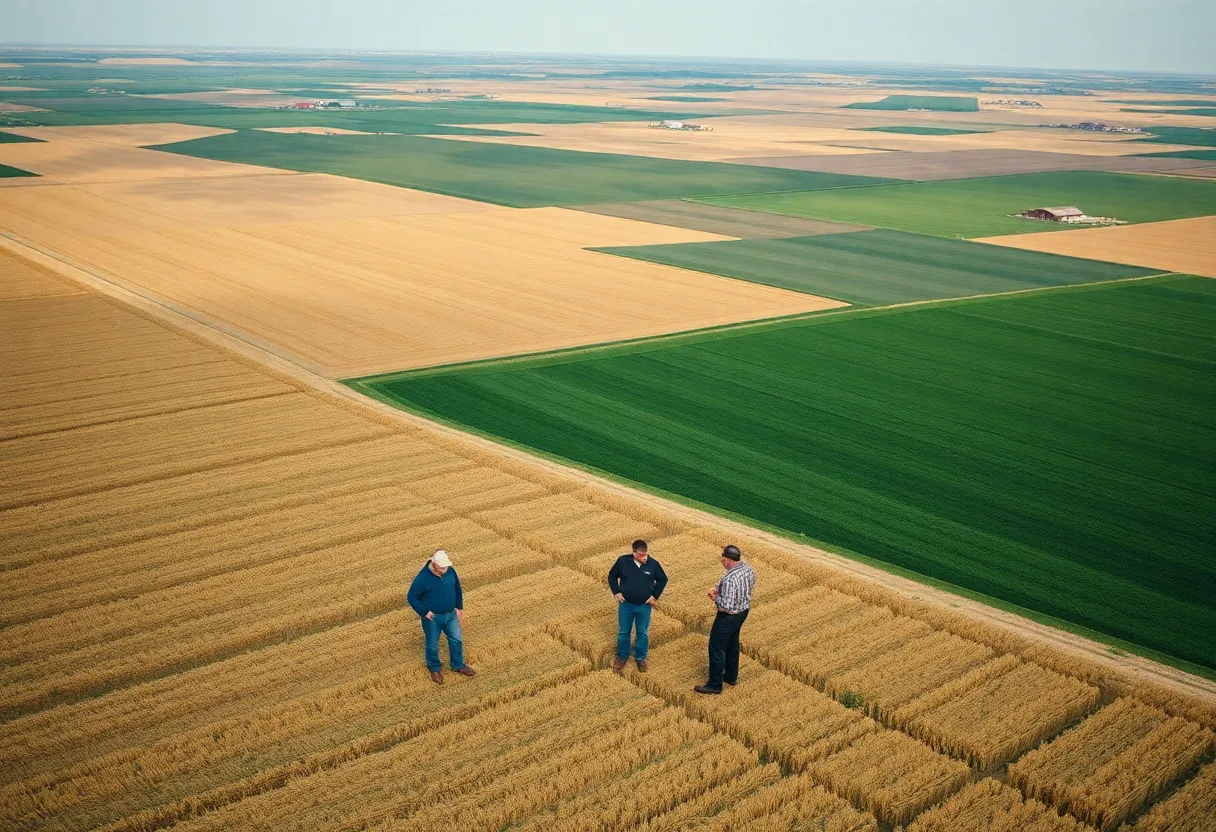Omaha, NE, October 7, 2025
Farmers in Nebraska and Iowa express mixed feelings about proposed federal bailouts aimed at alleviating losses from trade wars and market declines. While some embrace the financial help as essential for survival, others worry about long-term dependency on government aid. Local cooperatives are facilitating discussions among farmers as they navigate the application process and consider the potential impact of the bailouts on their operations.
Omaha, NE – Farmers in Nebraska and Iowa React to Proposed Federal Bailouts
Omaha, NE – As of October 7, 2025, farmers in Nebraska and Iowa are showing divided opinions on proposed federal bailouts designed to offset losses from escalating trade wars and declining agricultural markets. While some growers welcome the potential financial relief to stabilize their operations, others express concerns over the risk of creating long-term dependency on government support. The U.S. Department of Agriculture (USDA) is actively reviewing bailout applications, with initial decisions anticipated in the coming weeks.
The proposed bailouts come at a critical time for the region’s agricultural sector, which has faced significant pressure from international trade tensions. Tariffs imposed on key exports like soybeans and corn have reduced demand from major markets, leading to stockpiles and price drops. Local farming communities report that these factors have squeezed profit margins, prompting calls for federal intervention to bridge the gap.
Local agricultural cooperatives across Nebraska and Iowa have stepped up by organizing forums and discussion sessions for affected farmers. These gatherings provide a platform for growers to learn about the application process, share experiences, and weigh the pros and cons of accepting bailout funds. Participation has been strong, reflecting the urgency felt by many in the farming community as harvest seasons wind down with uncertain financial outcomes.
Details of the Bailout Program
The bailout initiative targets farmers who can demonstrate verifiable losses tied to trade disruptions and market slumps. USDA officials emphasize that the program aims to offer targeted assistance without encouraging indefinite reliance on aid. Applications must include detailed records of production costs, sales data, and evidence of market impacts. Reviewers are prioritizing cases where trade policies have directly contributed to reduced income, such as lost export contracts or unsold inventory.
Funding for the bailouts is drawn from existing federal agricultural support budgets, with allocations based on historical production levels and recent economic hardships. Officials expect the first round of approvals to cover immediate needs like debt servicing and operational costs for the upcoming planting season. However, the exact amount per farmer remains variable, depending on individual circumstances and overall program funding limits.
Mixed Reactions from the Farming Community
Among those in favor, many farmers highlight the bailouts as a necessary lifeline to prevent farm closures and sustain rural economies. They argue that without this support, smaller operations could face bankruptcy amid unpredictable global trade dynamics. Proponents see the aid as a temporary measure to weather the storm until trade negotiations improve market access.
Conversely, skeptics worry that repeated bailouts could foster a cycle of dependency, potentially undermining incentives for innovation and diversification in farming practices. These farmers advocate for long-term solutions, such as trade policy reforms or expanded domestic markets, over short-term financial injections. Discussions at co-op forums often revolve around balancing immediate relief with strategies for self-sufficiency.
Broader Context of Trade Wars and Market Challenges
The current trade wars, ongoing for several years, have reshaped agricultural exports from the Midwest. Nebraska and Iowa, major producers of grains and livestock, have been hit hard by retaliatory tariffs from trading partners. Market slumps have compounded the issue, with commodity prices hovering at multi-year lows due to oversupply and reduced international buying.
USDA data indicates that farm incomes in these states have declined by double-digit percentages over the past year, exacerbating existing pressures from rising input costs like fuel and fertilizers. The proposed bailouts are part of a larger federal response to these challenges, building on previous aid packages that provided mixed results in stabilizing the sector.
Co-op-hosted events are not only informational but also serve as hubs for networking, where farmers exchange tips on navigating applications and exploring alternative revenue streams, such as value-added products or local sales channels. As decisions loom, the agricultural community remains on edge, hopeful yet cautious about the path forward.
This situation underscores the vulnerability of Midwest farming to global economic shifts, prompting ongoing dialogue about resilience and policy adjustments. With applications under review, farmers await clarity on how the bailouts might influence their operations in the near term.
(Word count: 612)
FAQ
What are the proposed federal bailouts for farmers?
The proposed federal bailouts are designed to offset losses from escalating trade wars and declining agricultural markets for farmers in Nebraska and Iowa.
How are farmers reacting to the bailouts?
Farmers in Nebraska and Iowa are showing divided opinions: some welcome the potential financial relief, while others express concerns over the risk of creating long-term dependency on government support.
What is the status of the bailout applications?
The U.S. Department of Agriculture (USDA) is actively reviewing bailout applications, with initial decisions anticipated in the coming weeks.
What role are local co-ops playing?
Local agricultural cooperatives across Nebraska and Iowa have organized forums and discussion sessions for affected farmers to learn about the application process and share experiences.
Key Features Chart: Federal Bailouts for Nebraska and Iowa Farmers
| Feature | Description |
|---|---|
| Purpose | Offset losses from trade wars and slumping markets |
| Target Regions | Nebraska and Iowa farming communities |
| Application Status | Under USDA review, decisions expected soon |
| Reactions | Mixed: Relief vs. dependency concerns |
| Support Activities | Co-op forums for education and discussion |


